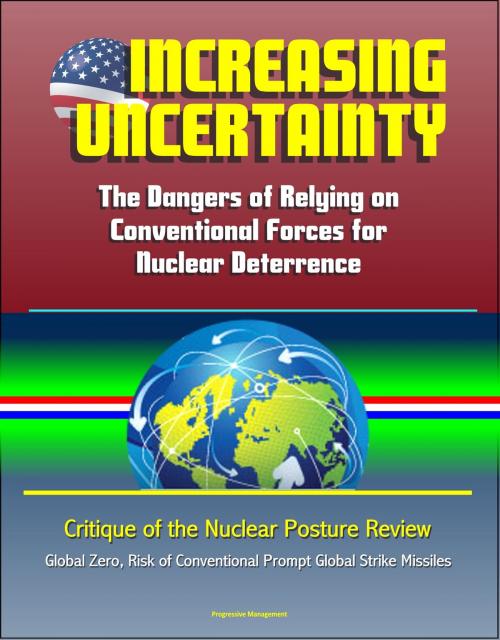Increasing Uncertainty: The Dangers of Relying on Conventional Forces for Nuclear Deterrence - Critique of the Nuclear Posture Review, Global Zero, Risk of Conventional Prompt Global Strike Missiles
Nonfiction, History, Military, Nuclear Warfare, Strategy| Author: | Progressive Management | ISBN: | 9781370712502 |
| Publisher: | Progressive Management | Publication: | March 22, 2017 |
| Imprint: | Smashwords Edition | Language: | English |
| Author: | Progressive Management |
| ISBN: | 9781370712502 |
| Publisher: | Progressive Management |
| Publication: | March 22, 2017 |
| Imprint: | Smashwords Edition |
| Language: | English |
This excellent report has been professionally converted for accurate flowing-text e-book format reproduction. In his now-famous Prague speech in 2009 shortly after taking office, President Obama laid out his vision for a world without nuclear weapons. Although he had no timeline for reaching this goal, noting that it might not even occur in his lifetime, part of the pathway to that objective involved reducing the role of nuclear weapons in US national security strategy. The Nuclear Posture Review (NPR), released one year later, further defined and codified his vision for the security of the United States and its allies. Five years later, some of the implications of how this decision affects the US deterrent relationship with both Russia and China are becoming apparent.
Arguably, these two are the United States' most important relationships and should serve as the cornerstone of US nuclear deterrence policy. Although Russia and China are not identified as adversaries of the United States, neither are they considered allies. Potential always exists for the relationship to sour, and in the case of Russia, that is exactly what has happened over the past year. The US decision to meet the needs of deterrence by relying less on nuclear weapons and instead developing conventional weapons that can have strategic effects may not have had the intended deterrent effect on Russia and China. Far from encouraging them to reduce the importance of nuclear weapons in their national security strategy, it may have inspired them to rely more on nuclear weapons to meet their security needs. Doing so could create dangerous instability in deterrence relationships.
According to the Global Zero US Nuclear Policy Commission, the increased lethality and precision of advanced conventional weapons allow the United States to hold at risk enemy targets that, at one time, were susceptible only to nuclear weapons. Furthermore, the commission observed that these weapons would have a greater deterrent effect because they were more "usable" than nuclear weapons. Moreover, the commission's research showed that a significant number of targets in Russia and China, once vulnerable only to US nuclear weapons, would be threatened by precision conventional forces. Additionally, as US capabilities and investments improve, more targets would become vulnerable to conventional capabilities, enabling the administration to reduce the role of nuclear weapons even further.
This excellent report has been professionally converted for accurate flowing-text e-book format reproduction. In his now-famous Prague speech in 2009 shortly after taking office, President Obama laid out his vision for a world without nuclear weapons. Although he had no timeline for reaching this goal, noting that it might not even occur in his lifetime, part of the pathway to that objective involved reducing the role of nuclear weapons in US national security strategy. The Nuclear Posture Review (NPR), released one year later, further defined and codified his vision for the security of the United States and its allies. Five years later, some of the implications of how this decision affects the US deterrent relationship with both Russia and China are becoming apparent.
Arguably, these two are the United States' most important relationships and should serve as the cornerstone of US nuclear deterrence policy. Although Russia and China are not identified as adversaries of the United States, neither are they considered allies. Potential always exists for the relationship to sour, and in the case of Russia, that is exactly what has happened over the past year. The US decision to meet the needs of deterrence by relying less on nuclear weapons and instead developing conventional weapons that can have strategic effects may not have had the intended deterrent effect on Russia and China. Far from encouraging them to reduce the importance of nuclear weapons in their national security strategy, it may have inspired them to rely more on nuclear weapons to meet their security needs. Doing so could create dangerous instability in deterrence relationships.
According to the Global Zero US Nuclear Policy Commission, the increased lethality and precision of advanced conventional weapons allow the United States to hold at risk enemy targets that, at one time, were susceptible only to nuclear weapons. Furthermore, the commission observed that these weapons would have a greater deterrent effect because they were more "usable" than nuclear weapons. Moreover, the commission's research showed that a significant number of targets in Russia and China, once vulnerable only to US nuclear weapons, would be threatened by precision conventional forces. Additionally, as US capabilities and investments improve, more targets would become vulnerable to conventional capabilities, enabling the administration to reduce the role of nuclear weapons even further.















